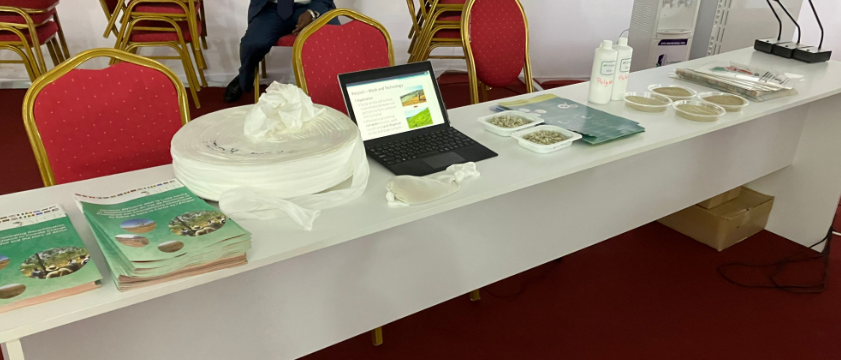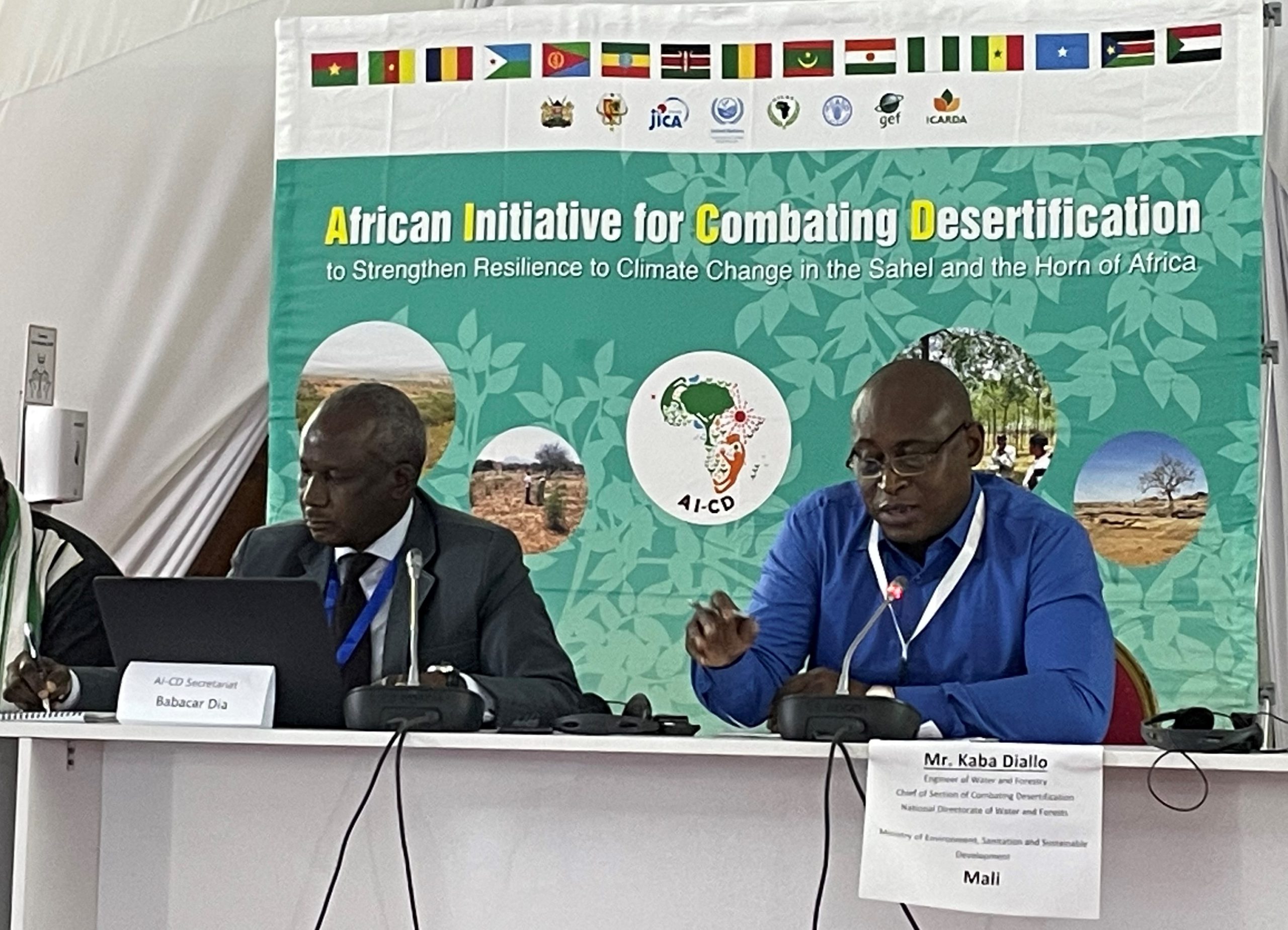Overview
A two-hour side event of the 15th Session of the Conference of the Parties of the United Nations Convention to Combat Desertification (UNCCD COP 15) was held in Abidjan, Cote d’Ivoire on 11 May 2022 hosted by the Japanese International Cooperation Agency (JICA), the Ministry of Environment and Forests (MEF) of Kenya, and the Ministry of Environment and Sustainable Development (MESD) of Senegal.
The event featured the AI-CD and attended by 70 participants from Africa and other countries, development partners, and universities. In consideration of the context of the UN Decade for Ecosystem Restoration and the theme of COP15, “Land. Life. Legacy: from Scarcity to Prosperity,” on-the-ground practices for combating desertification were introduced by AI-CD participating countries. Also, achievements and challenges of AI-CD on its focused activities through the years were shared among participants, as well as topics on networking, knowledge sharing, and access to finance.
Collaboration with the private sector was suggested by speakers as one of the important solutions to combat desertification. Finally, the importance of acquiring international funding, such as through the Great Green Wall (GGW), by utilizing a participating country‘s assets developed through AI-CD was highlighted.
The achievements of AI-CD shared by speakers, such as guidelines and short films produced, are accessible from the website below.
http://aicd-africa.org/key-products
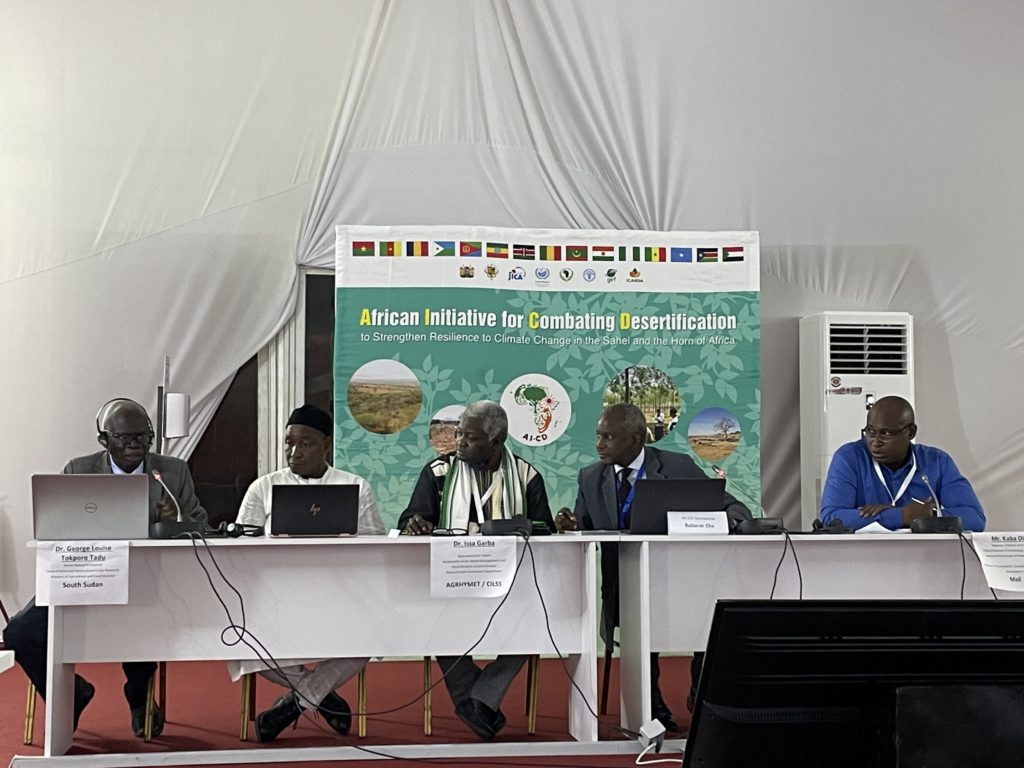
The panelists and moderator of the discussions at the side event
(From left, Dr. George Louise Tokporo Tadu, Dr. Issa Garba, Dr. Paul Ouedraogo, Mr. Babacar Dia, and Mr. Kaba Diallo)
Highlights of the Event
SESSION 1
Session 1 started off by an opening address and keynote speech. Then, the speakers highlighted the importance of continuing collaboration with Financial and Technical Partners (FTPs) and other stakeholders, and sharing achievements and challenges through AI-CD.
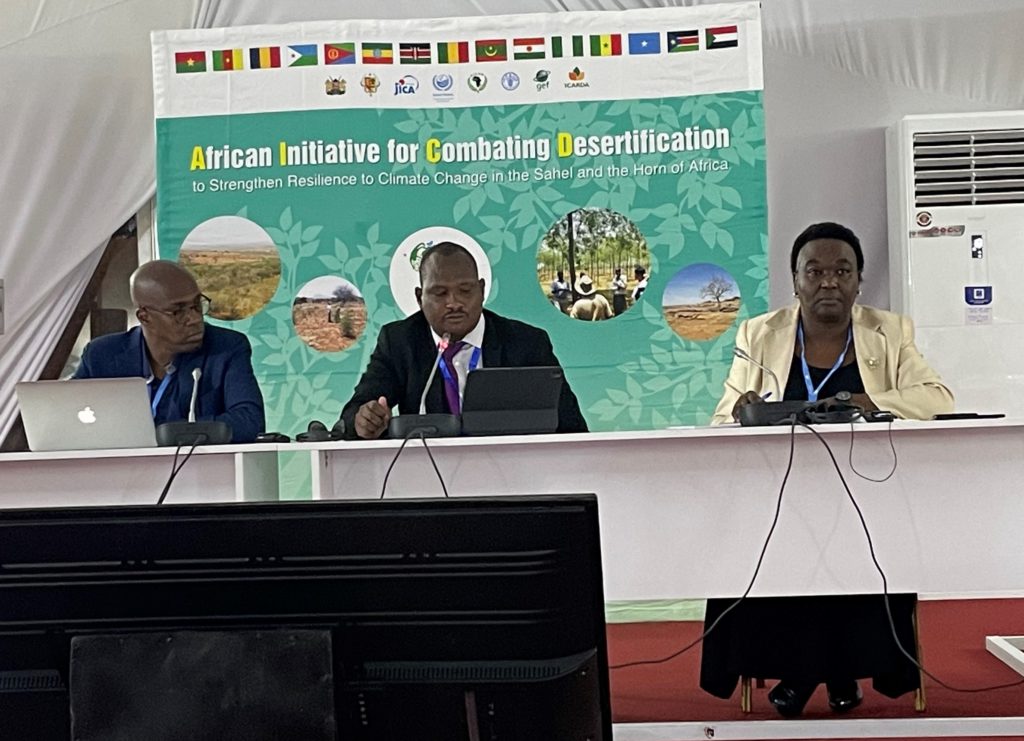
The speakers and the moderator of Session 1
(From left, Mr. Baidy Ba, Mr. Samson Toniok, and Dr. Lucy Ng’ang’a)
Dr. Lucy Ng’ang’a, Deputy Director of Multilateral Environment Agreements of the Ministry of Environment and Forestry (Kenya), who chaired this session, welcomed all the participants of the side event hosted by AI-CD.
Mr. Samson Toniok, Chief Executive Officer of NETFUND (National Environment Trust Fund) in Kenya, explained that the side event would provide a platform for AI-CD participating countries to share lessons, practical experiences, challenges, and opportunities. He added that it would also offer a great platform to engage with various international Financial and Technical Partners (FTPs) and have a direct dialog for mobilisation of resources. Mr. Samson finally expressed the hope that after the side event, there will be continuity of the initiative’s activities, application of lessons learned, and continuing collaboration with FTPs for sustainable advancement of African countries.
Mr. Baidy Ba, Director of Waters and Forests and AI-CD Focal Point (Senegal), emphasised that the success of the initiative requires the involvement and contribution of all the stakeholders, because the restoration of the degraded African ecosystems can only happen with a change in mentality to adopt sustainable solutions to satisfy people’s needs for farmland, domestic energy, etc. He also mentioned that since AI-CD is ending, the side event is a crucial opportunity for the stakeholders to assess their AI-CD achievements and experiences, and eventually come up with future perspectives for the resilience of African ecosystems and communities to land degradation and climate change.
Mr. Seiichi Onodera, Senior Vice President of JICA Headquarters (Japan), via a video message reminded that the event was an opportunity for AI-CD participating countries and partner organisations to share useful knowledge, on-the-ground practices in Africa, as well as the outcomes of AI-CD, and then have exchange on how measures could be promoted to effectively address desertification and climate change. He finally expressed the wish that the outcome of the working session would pave the way for continuous collaboration towards a prosperous and resilient Africa, and ensured that JICA will continue its support.
SESSION 2
In this session, the AI-CD Hubs and Secretariats reported all achievements and challenges of AI-CD since 2016 and pointed out necessary steps as way forward.
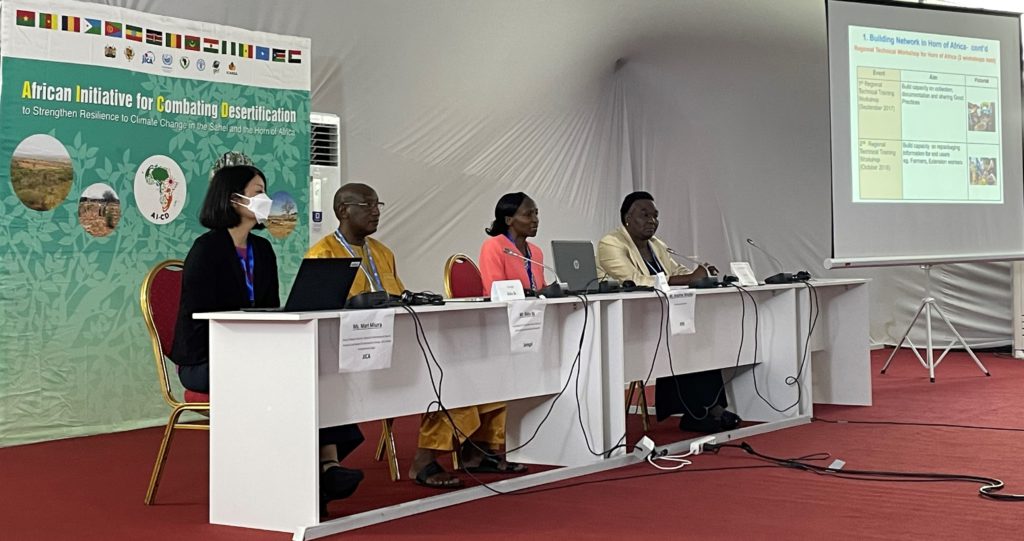
The speakers and moderator of Session 2
(From left, Ms. Mari Miura, Mr. Baba BA, Ms. Josephine Wanjiku, and Dr. Lucy Ng’ang’a)
Ms. Josephine Wanjiku of AI-CD Regional Hub for HoA (Kenya) started the session by giving a brief discussion about AI-CD since its launching at the 6th Tokyo International Conference on African Development (TICAD VI) in 2016, until its conclusion planned to be held at TICAD 8 in August 2022. She then presented the progress of AI-CD within the HoA and the way forward as follows:
Achievements of Output 1 (Networking): She mentioned about five regional forums held since 2017 as the achievements of networking. In addition to these, two technical workshops were held to train technical officers in 2017 and 2018.
Achievements of Output 2 (Knowledge Sharing): She mentioned two major publications, thanking all seven countries of the Horn of Africa for their contributions: a guideline and a book for combating desertification in the HoA (click the link to refer the publications). Brochures on good practices for combating desertification were produced and knowledge was also shared via the internet.
Achievement of Output 3 (Access to Finance): Project Concept Notes (PCNs) were developed and expected to transit to proposals for submission to targeted development partners. Participants were also assisted in identifying funding opportunities from development partners.
Way Forward: As the initiative is ending in August 2022, she proposed continuing the collaboration within the Horn of Africa and the Sahel region by establishing issue-based networks for knowledge sharing, and implementing capacity building based on a needs assessment in AI-CD participating countries and other Sub-Saharan African countries.
Mr. Baba BA of AI-CD Regional Hub for Sahel and Acting AI-CD Focal Point (Senegal) presented the achievements and challenges of AI-CD in Sahel region as follows:
Achievements and Challenges for Output 1 (Networking): He mentioned that one of the achievements of networking is the holding of five AI-CD Sahel regional forums since 2017. In addition to that, four countries (Mali, Senegal, Nigeria, and Burkina Faso) organised their national workshops to share the initiative’s activities and purpose at a national level.
In terms of challenges, he cited problems on mechanism and communication strategies for a better involvement of women and youth, and the lack of willingness of local authorities to assume their technical roles and responsibilities concerning the AI-CD.
Achievements and Challenges for Output 2 (Knowledge Sharing): He mentioned the two short films produced in Nigeria and Mali highlighting the successful experiences of AI-CD in terms of sharing good practices; also the webinar organised in collaboration with CILSS[1] to share the best techniques and technologies for combating desertification. On the other hand, the challenges faced include the lack of mechanisms and strategies enabling rural communities to adopt and master the techniques and technologies for combating desertification.
[1] Permanent Interstate Committee for Drought Control in the Sahel (French: Comité permanent inter-État de lutte contre la sécheresse au Sahel, abbreviated as CILSS)
Achievements and Challenges of Output 3 (Access to Finance): He mentioned that during the second forum of AI-CD in the Sahel region, the project concept notes (PCNs) of the different countries were presented to Technical and Financial Partners (TFPs). Each TFP made comments on the PCNs, which was followed by a presentation of their respective funding mechanisms. Following this, all the focal points met the FTPs to review the PCNs, which consequently were adapted to their requirements. At the end of this process, one Malian project was funded by FAO.
Way Forward: The Sahel Region plans to share the achievements of AI-CD at TICAD 8, aiming to maintain and deepen them in terms of networking with all the relevant stakeholders. Mr. Ba finally called on FTPs to support countries to reach out to the end-users who are generally not familiar with or do not have access to the internet.
Ms. Mari Miura, Senior Deputy Director of Global Environment Department, JICA Headquarters (Japan), mainly reviewed the key milestones of AI-CD, cross-regional achievements of AI-CD pillars, challenges faced, and the way forward for promoting effective measures and partnerships to address desertification and climate change. She mentioned the seven high-level side events organised using the opportunities provided by UNCCD COPs and TICADs, including the ongoing one at that time. She then presented the cross-regional progress report of AI-CD as follows:
Achievements of Output 1 (Networking): She explained that international AI-CD co-organisers and partners (JICA, UNCCD, FAO, CILSS, ICARDA, and GEF) and a number of development partners (Great Green Wall/AU, AfDB, UNDP, etc.) were engaged in the initiative.
Achievements of Output 2 (Knowledge Sharing): She said that online platforms, as well as regional forums, served the purpose of sharing knowledge, good practices, and country initiatives. All of these were documented as “HoA Guidelines and Case Study” and “Sahel Knowledge Policy Brief” with the contribution of AI-CD participating countries.
Achievements of Output 3 (Access to Finance): She mentioned that AI-CD itself is not associated with a specific financial mechanism. However, its role is to help partner countries have access to any available funding. She also cited JICA’s contribution as a bilateral donor.
Three training sessions were held in Japan and two others were held in an online manner due to restrictions posed by the COVID-19 pandemic. Moreover, JICA supported some participating countries to implement their action plans on the ground.
She went on to inform that the challenges faced included matching the PCNs of AI-CD participating countries with the funding systems of TFPs due to diversity of their requirements.
Way Forward: For countries, she emphasised the need to enhance their initiatives to develop and implement projects. Regarding partners, she recommended that the harmonisation of global and regional initiatives be enhanced to support countries in an effective manner.
SESSION 3
The topic of Session 3 (panel discussion) was “Accelerating Efforts to Combat Desertification and Tackle the Impacts of Drought Towards 2030 and Beyond.” In this session the importance of acquiring international funding, such as through Great Green Wall (GGW), by utilising each participating country‘s assets developed through AI-CD were highlighted by the speakers.
Dr. George Louise Tokporo Tadu, AI-CD Focal Point (South Sudan), informed that the project developed by South Sudan, entitled “Peri-urban Focus Community-Integrated Farming” was submitted to JICA for funding and, fortunately, was approved.
He said that one significant achievement was networking and technology transfer, and South Sudan received training for developing and managing nurseries through a study tour at KEFRI in Kenya.
In terms of challenges, Dr. Tadu mentioned the lack of technical and financial capacities to develop bankable proposals; and political and civil instability posed also some difficulties.
Mr. Kaba Diallo, AI-CD Focal Point (Mali), focused on discussing a project for the sustainable management of land and water. He informed that the major lessons learned from its implementation were the following: women have no control over land resources; realisation that the adoption of some good practices requires a certain number of equipment; and the development of a network of service providers made it possible to provide support to farmers at the local level.
Dr. Paul Ouedraogo, Deputy Executive Secretary of CILSS (Senegal), explained that CILSS works on sustainable land management and drought monitoring, and provides capacity building. He invited the AI-CD participating countries to send their executives to CILSS so that they can receive training, and encouraged the countries to put all the best practices of AI-CD on national and regional platforms in order to better influence policies on sustainable land management.
Dr. Issa Garba, Agro Pastoralist Expert of CILSS (Senegal), emphasised that the work done by CILSS can contribute to scaling up actions by identifying the areas affected by land degradation. CILSS also works at local and community levels by producing detailed maps, and has a lot of experience in terms of the sustainable management of land.
Mr. Yasuo Izumi, AI-CD Secretariat (Japan), mainly focused on access to finance and explained the achievements and progress made by AI-CD focal points and partners. He recognised that the initiative had endowed all the 15 AI-CD participating countries with practical tools and knowledge, enabling them to advocate new projects with their PCNs.
In terms of future actions, he recommended further collaboration and coordination with other AI-CD-related ministries, agencies, private companies, and NGOs. Then, as an example of collaboration with the private sector, he introduced products of some Japanese private companies which can contribute in combating desertification. He also emphasised the need to match national strategies with those of TFPs and called on all participating countries to go beyond AI-CD and continue AI-CD-related activities.
- Products of Japanese private companies which can contribute in combating desertification displayed at the side event
- Panelist Mr. Diallo (Focal Point of Mali) (right side in the picture) explaining on-the-ground good practices in Mali
SESSION 4: Closing
Mr. Babacar Dia, AI-CD Secretariat (Senegal), concluded that the ending of AI-CD can signify the beginning of collaboration with international funders such as Great Green Wall.
He also thanked the distinguished participants for the quality discussions held, and declared the meeting closed on behalf the AI-CD Secretariat.

